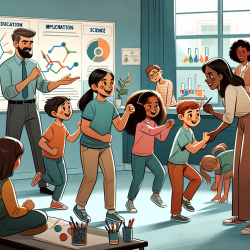Practitioners working with children who have Specific Learning Disorders (SLD) and Type 1 Diabetes Mellitus (T1DM) face unique challenges. A recent review article, "Priorities in the Interdisciplinary Approach of Specific Learning Disorders (SLD) in Children with Type I Diabetes Mellitus (T1DM). From Theory to Practice," provides valuable insights into these challenges and offers practical recommendations. This blog will summarize key findings from the research and discuss how practitioners can apply these insights to improve outcomes for children.
The Intersection of SLD and T1DM
Children with SLD and T1DM experience a complex interplay of challenges that affect their cognitive functioning, psychological well-being, and school performance. The reviewed literature indicates that children with learning difficulties have higher rates of diabetes compared to the general population. Additionally, T1DM can negatively impact cognitive functioning and mental health, further complicating the educational experience for these children.
Key Findings from the Research
The review highlighted several critical points:
- Psychological Well-being: Children with T1DM are at a higher risk of mental health issues, including depression and anxiety, which can exacerbate their learning difficulties.
- Cognitive Functioning: T1DM can lead to subtle neurocognitive impairments, particularly in attention and memory, which affect academic performance.
- Interdisciplinary Approach: Effective management of SLD and T1DM requires a coordinated effort among healthcare providers, educators, and families.
Implementing an Interdisciplinary Approach
Based on the findings, practitioners can take several steps to enhance outcomes for children with SLD and T1DM:
- Early Intervention: Identifying and addressing learning difficulties and diabetes management issues early can prevent long-term negative outcomes. Early intervention should involve both medical and educational assessments.
- Family Involvement: Educating and involving families in the management of both SLD and T1DM is crucial. Families should be provided with resources and support to help them understand and manage their child's conditions.
- School Support: Schools should implement individualized education plans (IEPs) and provide accommodations to support children with SLD and T1DM. Collaboration between school psychologists, teachers, and healthcare providers is essential.
- Mental Health Support: Regular mental health screenings and access to psychological support can help manage the emotional and behavioral challenges associated with T1DM.
Encouraging Further Research
While the reviewed research provides valuable insights, more studies are needed to understand the full impact of T1DM on children with SLD. Practitioners are encouraged to contribute to and stay informed about ongoing research in this area.
Conclusion
An interdisciplinary approach that involves early intervention, family involvement, school support, and mental health services is key to improving outcomes for children with SLD and T1DM. Practitioners play a crucial role in implementing these strategies and advocating for further research. To read the original research paper, please follow this link:
Priorities in the Interdisciplinary Approach of Specific Learning Disorders (SLD) in Children with Type I Diabetes Mellitus (T1DM). From Theory to Practice.










